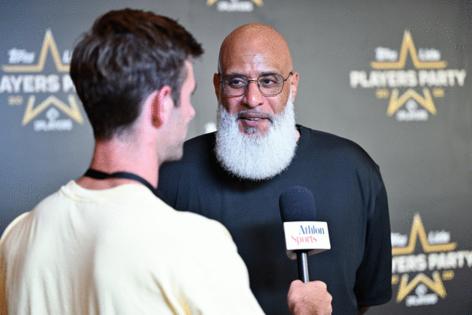Paul Zeise: Tony Clark, MLBPA are steering their members down the wrong path
Published in Baseball
PITTSBURGH — MLBPA boss Tony Clark met with the media during All-Star Week to talk about the economics of baseball, and of course, that means attacking the idea of a salary cap in baseball.
After watching some of the clips of the interview and reading the quotes, I wasn't sure if Clark was doing the talking or if he was just taking marching orders from super agent Scott Boras and company on what to say.
Clark insists that a salary cap is bad for baseball, that it pits players against players, that it is suppression of some sort, that it doesn't reward excellence and yada yada yada ... essentially all of the talking points we have heard from agents of the top players over the years.
I have hoped that at some point, the rank and file players — those not named Shohei Ohtani, Aaron Judge, or Juan Soto — would wise up and understand that the union isn't looking out for them. The union is ruled by and run by the Boras types of the world, and their only interest is the maximum salary they can get for their top-end clients.
Yet despite all the huffing and puffing about baseball having the strongest union and that its lack of a salary cap is good for players, MLB doesn't have the highest average salaries of the four professional leagues, the lowest per-game average or the highest-paid player.
Soto makes an average of $61.875 million per year, making him by far the highest-paid player in Major League Baseball — but that would make him the fourth-highest paid NBA player.
MLB has only four players making $40 million or more per season (Ohtani's deal has so much tied up in deferred money that he isn't technically one of the highest-paid players, but we can add him as five), while the NBA has about 16 guys making more than that.
And even the NFL, which only plays 16 games, has eight players making $40 million per season or more.
In other words, the top-paid players in the two top salary cap leagues (the NHL lags way behind all three of these leagues in revenue generated, which is why its players get paid relatively little) make as much or more than the top-paid players in Major League Baseball.
That doesn't sound like "suppression" to me, and quite frankly, it is silly that this is what Clark and his ilk suggest.
A salary cap would save baseball in more ways than just making it more competitive. A salary cap would require a salary floor, which would mean owners would have to pay more money to mid-level players and veterans. A lot more money would have to be spent to reach the salary floor, and if it were structured right, like the NBA's softer cap, there could be exceptions for veterans.
Major League Baseball owners don't want a salary cap because there are too many Bob Nuttings out there who don't want to be forced to spend to a floor. And there are enough owners at the top of the food chain who don't want to be limited in what they spend.
But the fact is that the group from which a salary cap would most benefit — veterans who aren't superstars and solid role players — is the overwhelming majority of the membership. I have no idea why they consistently vote against a salary cap, and if you look at the top-paid players in the NBA and NFL, there is no reason for the superstars to vote against a cap, either.
The other part is that Clark should use a salary cap, which actually helps his membership, as a bargaining chip to get a few things that would actually help his union and allow players to make more money in their careers.
The largest issue is the pre-arbitration and arbitration years, during which clubs can basically take advantage of star players by paying them nothing. If Clark really wants to help his membership, he should attack this.
How is it right that Paul Skenes, for instance, has to wait until after the 2029 season before he can actually cash in on his talents? How is it right that the Pirates get to pay the best pitcher in baseball peanuts for another season beyond this one?
Clark should also attack the fact that of the four major sports, MLB shares the least amount of revenue with its players. He could change that as well. Again, "the strongest union in sports" gets the lowest percentage of revenue for its players of all four sports, which tells me the union's strength is overblown.
Those are two things Clark should be focused on fighting and changing, not a salary cap, which has become a bit of a bogeyman for the top agents, who don't care about the rank and file or the game of baseball. Boras cares about making as much money as possible for Boras, and that means being able to negotiate limitless deals for the highest-paid players.
None of that is in baseball's best interest, and the fact that Clark is so adamant against a salary cap suggests he isn't operating in his players' best interest, either.
A salary cap would work well in baseball and is something the overwhelming majority of players should embrace.
© 2025 the Pittsburgh Post-Gazette. Visit www.post-gazette.com. Distributed by Tribune Content Agency, LLC.







Comments